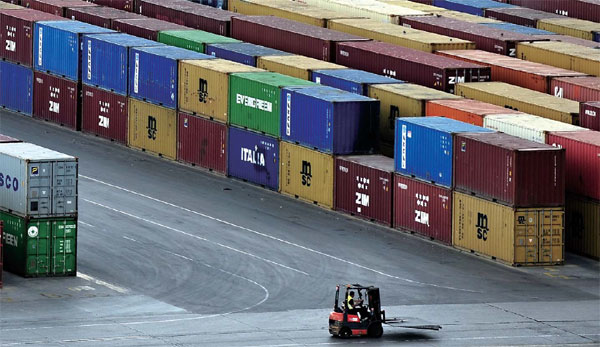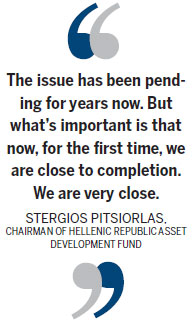China top suitor for Greek port share
Updated: 2015-12-11 08:19
By Maria Petrakis(China Daily Europe)
|
|||||||||||
|
A worker loads containers in the Piraeus Container Terminal, operated by Chinese state-owned shipping giant Cosco. AP |
Chinese companies are pumping billions into Europe. Annual investment by Chinese companies in EU member states soared from virtually zero in the mid-2000s to 14 billion euros last year, according to a June report by Rhodium Group and the Mercator Institute for China Studies. "China's changing global outbound foreign direct investment footprint presents a once-in-a-lifetime opportunity for attracting capital to Europe and helping restart investment and economic growth," the report says.
That is something the Syriza government apparently has come to realize, commentators say.
China "appears to have no limit to available funds", says Andy Lane, a partner at Container Transport International Consultancy in Singapore. "The Greeks, on the other hand, need to sell the family silver to balance the books after decades of unsustainable existence - so it is in many respects an excellent marriage of convenience."
Piraeus' relatively short distance from the main Mediterranean maritime route allows it to act as both a trans-shipment hub and gateway, according to a 2012 report by McKinsey & Co, which said the country could transform itself into a regional cargo and logistics center as part of a 10-year plan. The existing infrastructure and deals with international operators such as Cosco provided a good starting point and critical mass for future expansion, McKinsey said.
Such a transformation of Piraeus and Thessaloniki, the second-largest harbor, which is also for sale, could add 9,000 new jobs over 10 years and about 1.3 billion euros in annual gross value added, McKinsey said.
On the road to the headquarters of Cosco's Greek unit, Piraeus Container Terminal SA, graffiti urges Cosco to leave and for Piraeus Port to remain in workers' hands. A banner exhorting locals to join a strike against the government's latest round of austerity measures - foreclosures and pension reforms - on Nov 12 is still strung along the side of traffic lights.
Inside Piraeus Container Terminal's headquarters, the tone is different. China's links with Greece are displayed side by side on the walls of the corridors, beginning with two large photos of an Olympic stadium in Athens from 2004 when the country hosted the Games next to Beijing's iconic Bird's Nest stadium from China's Olympic Games, four years later.
There are also signs of better days in Sino-Greek relations. In the lobby of the building, former prime minister Antonis Samaras, one of the champions of Cosco's investments in Greece, is photographed in a hard hat at the pier. In January, he called the Cosco investment the most important in Greece in the past decade, three days before he lost his job to Tsipras, whose election platform had included plans to put a brake on state asset sales, sparking concern among Chinese officials.
Cosco has seen five separate Greek premiers, not including caretakers, since it won the license to operate Pier II in 2008 for 30 years at a cost of 490 million euros. The deal has become a regular campaign issue as Greek politicians seek votes from union workers, such as those in the Piraeus docks, unhappy about austerity measures.
For Tassos Vamvakidis, a Greek who has been the commercial manager for the Cosco unit since it first got its Piraeus concession, actions speak louder than words. Cosco's investment in Piraeus, he says, has created 1,247 jobs.
"Greece has to play a central role," he says. "Because there are others who would like to also play that role."
Pier II is now Cosco's biggest container terminal in Europe, slicing four to 10 days off routes to bigger ports like Rotterdam and Hamburg. It is the closest northern Mediterranean port to the Suez Canal. Electronics goods from companies like Hewlett Packard and Sony transit through Piraeus and then travel by rail to Central and Eastern Europe.
For China, says Lane of Container Transport International Consultancy, the Silk Road is less a single carriageway, with a start and an endpoint, than a web of solid infrastructure that facilitates multiple supply chains to and from China, part of an overall supply chain jigsaw puzzle. That now includes a Turkish port, Kumport Container Terminal, which Cosco bought jointly with China Merchant Holdings in October. Limassol, in Cyprus, is also being eyed by the Chinese.
Pitsiorlas dismisses concerns that those investments could pull transshipment volumes away from Piraeus. "Neither of these can replace Piraeus," he says. "Piraeus is of central significance to them."
Today's Top News
Xi calls for shared future in cyberspace
China successfully launches its first dark matter satellite
China becomes shareholder in European bank
Jeb Bush calls Trump a 'chaos candidate'
French report stresses China's growth offers new opportunities
Reasonable economomic growth rate targeted
French far-right fails to win any regions
Obama says anti-IS fight continues to be difficult
Hot Topics
Lunar probe , China growth forecasts, Emission rules get tougher, China seen through 'colored lens', International board,
Editor's Picks

|

|

|

|

|

|








